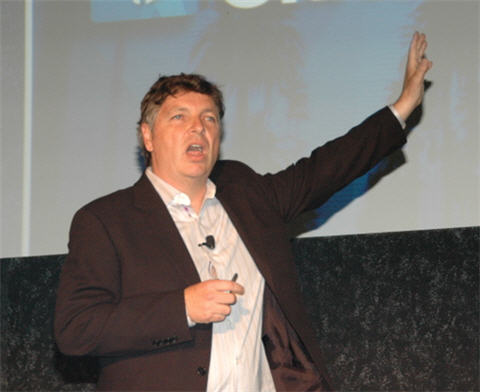OnHollywood: The future of media, YouTube, .tv and the digital universe

After spending a day at MIX07 in Las Vegas, I landed in Hollywood to attend the AlwaysOn OnHollywood conference. AlwaysOn founder and OnHollywood host Tony Perkins set the tone for the event with his opening remarks to the crowd of technology execs and digital media and Hollywood types.

As an example of the new Hollywood, I am sitting next to Justin Kan of Justin TV, the new reality TV show that only requires a tiny camera mounted on a baseball hat and an Internet connection to live stream 24x7.
SlingMedia won the OnHollywood Award for the Slingbox, which allows you to watch and control your TV from anywhere. "If you serve the customer well, it doesn't mean the industry will fail," Krikorian said, citing billions of dollars in movie ticket and DVD sales. In other words, the Internet isn't a threat to Hollywood if Hollywood can figure out how to give customers what they want, when they want it and how they want it.
Richard Rosenblatt of Demand Media and and business partner Carson Daly, host of "Last Call with Carson Daly," launched .tv (http://www.me.tv/), which allows people to create their own Internet TV channels, aggregating video from across the Web and photos, as well as blogging and sharing content. Sounds like another video-focused social networking player and competitor in the ecosystem of YouTubes and MySpaces.
Following Tony's opening ceremonies, Daly moderated a panel, "How the Rules Changed. One Year Later," with YouTube co-founder Chad Hurley, Michael Robertson of MP3tunes, Rosenblatt and Krikorian.
Asked what he would do if he were running a traditional studio, Hurley said, "I would look for opportunities to get in front of audiences and diversify distribution." YouTube has been working with the media companies (not Viacom), he said, and studios have seen ratings rise as a result of having content on YouTube. The other panelists agreed with the focus on diversifying distribution.
Robertson said that the music companies are in crisis mode, but video players have more time to figure out how to transition to more of an online business model.
Krikorian said that every day that the incumbents don't embrace the democratization of content they are giving ground to creative producers outside the system. The cable companies have the world at their fingertips if they chose to seize the opportunity, he said.
On the monetization side, Hurley talked about sharing revenue with video content producers, taking advantage of Google expertise in online advertising. Robertson said the people won't make much money in that way, and that to make good money you "have to graduate up the media food chain." Robertson added, "Just because anybody can have a webcam, doesn't mean they can produce interesting content." That depends on how you define "interesting."
The shift to ad spending online is happening, but the "iceberg is melting slowly," Robertson said. "If you look at Google and total advertising, the Internet is still a small percentage of overall ad spending. The technology [for targeted video advertising] is there but the buyers aren't." Krikorian added that once the established media companies face the fact fully that people skip ads, they will think more seriously about moving more online.
Rosenblatt thinks that advertisers will pay high rates for micro-communities, such as the best user- generated pilates site. He called it "synthesizing content into verticals," which appears to be a core part of Demand Media's business model for .tv.
Robertson quipped that Hurley just joined the nine-digit club (referring to his newfound wealth) and the ten-digit club for lawsuits, incurring the wrath of the companies at the same time they want to work with GooTube.
"People focus on the lawsuit. We have a bigger vision working with thousands of media companies, and we are building solutions to monetize and create a new market," Hurley said. "We signed most of the major music labels to YouTube. With the content on our site and ads against it, we have a revenue source and it allows people to be creative."
He did note that rights issue for content can be very complicated, having to negotiate with individuals, families, estates, trusts and corporations to come to an agreement.
Asked about bring YouTube content to the TV set, Hurley said, "Down the road we will get there. Right now we are concentrating on the mobile market, putting content on the phone. With connection speeds increasing and cell phones with the ability to take video we want to take advantage of that."
As a final question, each panelist was asked to describe the shifting media universe one year in the future.
Rosenblatt said that media companies would become more aggressive online, and users will focus on developing their own channels and the Web will become more vertical. Sounds again like .tv.
Roberston cited the continuing battle over digital rights management. EMI's deal with Apple is a first step, and music is pushing hard in a non-DRM direction, which is good if you are MP3tunes. The video world is still up in the air, he said.
Krikorian joked that hopefully he will still have a job running SlingMedia or he will become Hurley's butler. More seriously he said that the consumer backlash is about to hit. "Steve Jobs saw it coming. The same thing is going to happen on the video side, but it's a harder problem to solve."
Hurley said there will be opportunites for media companies to distribute on many different platforms and ways to monetize the content. And, for YouTube in particular, getting the content on mobile handsets and going global, being relevant to other parts of world. More GooTube than YouTube next year.